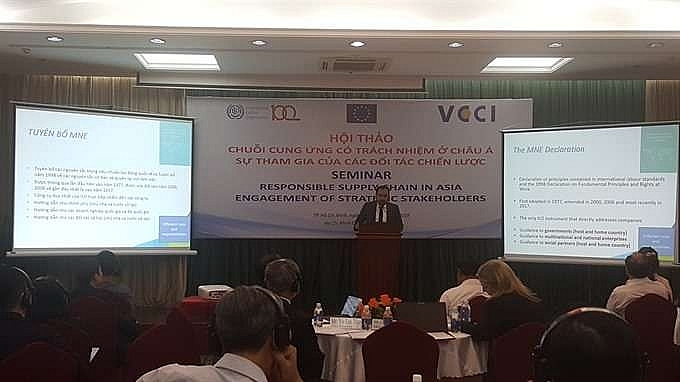EU, ILO begin project to improve corporate social responsibility
 |
| Fredy Guayacan, the programme manager, at the seminar held in HCM City to introduce the project. - VNS Photo Hoang Nam |
“The project aims to promote responsible supply chains in increasing corporate social responsibility/responsible business conduct (CSR/RBC) system with regards to decent work, environmental sustainability and respect for human rights,” Fredy Guayacan, the programme manager, told a seminar held in HCM City on Tuesday to introduce the project.
The project is based on the 2017 ILO Tripartite Declaration of Principles concerning Multinational Enterprises and Social Policy and 2011 OECD Guidelines for Multinational Enterprises, he said.
“The project targets to increase understanding and knowledge of investors, businesses, civil society organisations and policy makers on CSR/RBC from the perspective of decent work.
“Its goals are to create a policy environment conducive to the promotion of socially responsible practices among businesses and increase opportunities for businesses to have a dialogue on good practices, challenges and opportunities in relation to CSR/RBC.”
To achieve the goals, the project has made recommendations in five areas for governments and enterprises.
“General policies should be fundamental principles and rights at work, due diligence and promotion of good corporate behaviour and consultations between home and host country governments.
“Employees should get promotion, social security and equality of opportunity and treatment and [there should be] no forced labour, no child labour.
“Vietnam should have national policies for vocational training and guidance, closely linked to employment, that require contribution of enterprises to skills development in country.
“For industrial relations, local authorities and enterprises must ensure freedom of association and right to organise, collective bargaining, consultation, access to remedy and examination of grievances and settlement of industrial disputes.
The project has been implemented in six Asian nations: Japan (electronics, vehicle parts), China (electronics, textiles), Myanmar (seafood, agriculture), the Philippines (agriculture/food), Thailand (agriculture, vehicle parts) and Vietnam (wood processing, seafood, aquaculture, textiles).
To implement the project, a preliminary study on CSR/RBS in the seafood processing sector was done last December by the Research Centre for Resources and Rural Development (RECERD).
Lê Văn Bằng, a RECERD consultant, said: “Vietnam has a sufficient legal framework to guide and manage labour and CSR issues and fully implement the ILO conventions that have been ratified.
“The country has made clear delegation to related agencies and organisations to deploy, monitor and ensure issues related to labour interests are dealt in accordance with the law. However, businesses’ understanding of and compliance with the legal regulations are still limited.”
The study found that CSR/RBC staff at enterprises did not fully understand the purpose of CSR implementation and their roles vis-a-vis workers and management.
Reluctance to pay insurance premiums and overtime wages were perceived as obstacles to attracting labour and the majority of regular workers said they were satisfied with the Trade Union as their representative.
They did not know that other organisations could represent workers.
A large number of seasonal workers (20-30 per cent), who move freely between factories/sectors create difficulties/challenges for employers in implementing CSR and fulfilling their responsibilities as committed to their workers in labour/ social insurance contracts.
In many cases, employees were not willing to sign labour contracts since they did not want 10.5 per cent of their salaries deducted to pay social/ health insurance premiums.
“Very few workers are aware of ILO and MNE Declaration,” Bằng said.
“Communication activities should be enhanced to explain the nature and benefits of CSR/RBC implementation, and CSR/RBC employees at enterprises should be well equipped with this knowledge so that they are fully aware of the significance of their roles and motivated to fulfil their tasks.”
What the stars mean:
★ Poor ★ ★ Promising ★★★ Good ★★★★ Very good ★★★★★ Exceptional
 Tag:
Tag:
Related Contents
Latest News
More News
- Congratulations from VFF Central Committee's int’l partners to 14th National Party Congress (January 25, 2026 | 09:46)
- List of newly-elected members of 14th Political Bureau announced (January 23, 2026 | 16:27)
- 14th Party Central Committee unanimously elects To Lam as General Secretary (January 23, 2026 | 16:22)
- List of members of 14th Party Central Committee announced (January 23, 2026 | 09:12)
- Highlights of fourth working day of 14th National Party Congress (January 23, 2026 | 09:06)
- Press provides timely, accurate coverage of 14th National Party Congress (January 22, 2026 | 09:49)
- Press release on second working day of 14th National Party Congress (January 22, 2026 | 09:19)
- Minister sets out key directions to promote intrinsic strength of Vietnamese culture (January 22, 2026 | 09:16)
- 14th National Party Congress: Renewed momentum for OVs to contribute to homeland (January 21, 2026 | 09:49)
- Party Congress building momentum for a new era of national growth (January 20, 2026 | 15:00)






















 Mobile Version
Mobile Version